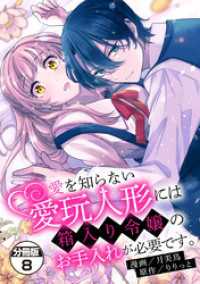- ホーム
- > 洋書
- > 英文書
- > Literary Criticism
Full Description
Nineteenth-century Japanese literary discourse and narrative developed a striking preoccupation with ninjō—literally "human emotion," but often used in reference to amorous feeling and erotic desire. For many writers and critics, fiction's capacity to foster both licentiousness and didactic values stood out as a crucial source of ambivalence. Simultaneously capable of inspiring exemplary behavior and a dangerous force transgressing social norms, ninjō became a focal point for debates about the role of the novel and a key motor propelling narrative plots.
In Licentious Fictions, Daniel Poch investigates the significance of ninjō in defining the literary modernity of nineteenth-century Japan. He explores how cultural anxieties about the power of literature in mediating emotions and desire shaped Japanese narrative from the late Edo through the Meiji period. Poch argues that the Meiji novel, instead of superseding earlier discourses and narrative practices surrounding ninjō, complicated them by integrating them into new cultural and literary concepts. He offers close readings of a broad array of late Edo- and Meiji-period narrative and critical sources, examining how they shed light on the great intensification of the concern surrounding ninjō. In addition to proposing a new theoretical outlook on emotion, Licentious Fictions challenges the divide between early modern and modern Japanese literary studies by conceptualizing the nineteenth century as a continuous literary-historical space.
Contents
Acknowledgments
List of Abbreviations
Introduction
Part I: Ninjō and the Early-Modern Novel
1. From Ninjō to the Ninjōbon: Toward the Licentious Novel
2. Questioning the Idealist Novel: Virtue and Desire in Nansō Satomi hakkenden
Part II: The Age of Literary Reform
3. Translating Love in the Early-Meiji Novel: Ninjōbon and Yomihon in the Age of Enlightenment
4. Historicizing Literary Reform: Shōsetsu shinzui, Translation, and the Civilizational Politics of Ninjō
5. The Novel's Failure: Shōyō and the Aporia of Realism and Idealism
Part III: Late-Meiji Questionings
6. Ninjō and the Late-Meiji Novel: Recontextualizing Sōseki's Literary Project
Epilogue
Notes
Bibliography
Index
-

- 電子書籍
- スイート・スイーパー【タテヨミ】 第3…
-

- 電子書籍
- この度、冷酷公爵様の花嫁に選ばれました…
-

- 電子書籍
- 愛を知らない愛玩人形には箱入り令嬢のお…
-

- 電子書籍
- Meets Regional 2022…
-

- 電子書籍
- 私と夫と夫の彼氏 分冊版 10巻 ゼノ…



